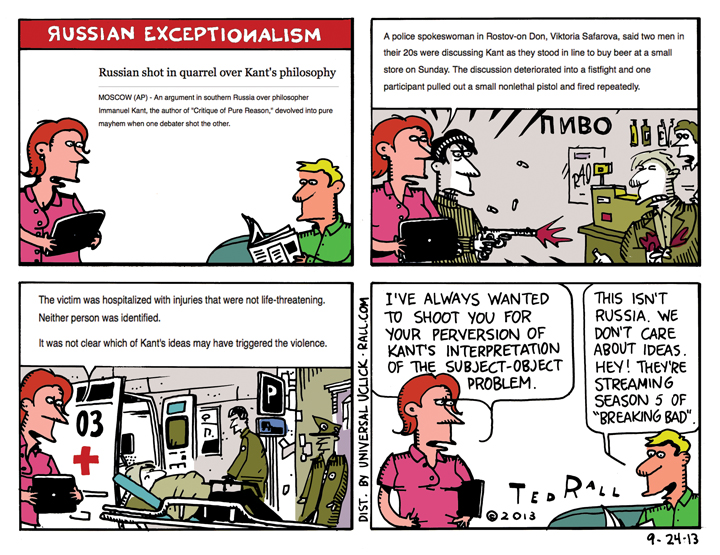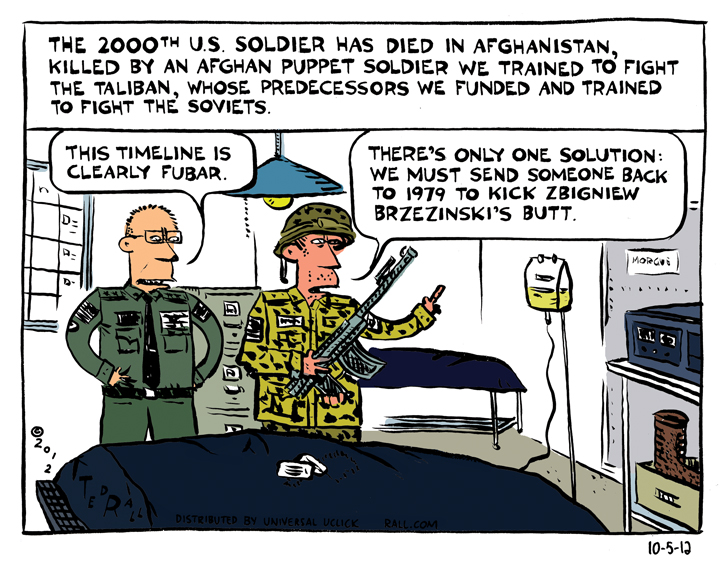
What the Media Can’t/Won’t Tell You About Why Russia Invaded Ukraine
As usual, America’s foreign correspondents are falling down on the job.
Stories devoid of historical context cast Russia’s invasion of Ukraine as a naked act of neo-Soviet aggression. Considering that the relevant history begins a mere two decades ago, its omission is inexcusable.
The spark that led to the takeover of Crimea was not the overthrow of President Viktor Yanukovich. It is what happened the day after.
A 2012 law gave the Russian language official status in regions where Russians comprise more than 10% of the population. This is the case in most of eastern Ukraine and particularly in Crimea, where 59% are ethnic Russians.
One week ago, Ukraine’s rump parliament (members of Yanukovich’s party, hiding from opposition forces and in fear for their lives, didn’t show up) took advantage of Yanukovich’s downfall to overturn the language law. Americans didn’t notice, but Russians did.
“Attack on the Russian language in Ukraine is a brutal violation of ethnic minority rights,” Konstantin Dolgov, the Russian Foreign Ministry’s commissioner for human rights, tweeted that day.
Seems a little over-the-top, right?
Sure, but only if you don’t know that millions of ethnic Russians in former Soviet Republics have suffered widespread discrimination and harassment since the 1991 collapse — and that their troubles began with laws eliminating Russian as an official language.
Laws like the one passed last week in Ukraine.
The demise of the Soviet Union left 25 million Russians stranded in 14 newly independent states, in such countries as Belarus, Azerbaijan, Turkmenistan and Ukraine. These new countries had to scramble in order to create the trappings of national identity virtually overnight. They designed new flags, composed national anthems and printed new currency.
To instill a sense of loyalty and patriotism, the governments of many of the freshly-minted republics resorted to rank nationalism.
Nationalism isn’t just about what your country is. It’s also about what it isn’t. This requires defining some things — some people — as outsiders. Unwanted. Scapegoats. Enemies of the state.
Turkmenistan, a Central Asian dictatorship and former Soviet republic in Central Asia, is one example. It instituted a policy of “Turkmenization” after 1991. Russians, a privileged group before independence, were now refused work permits. A 2000 decree banned the use of the Russian language in official business; since Turkmenistan is a totalitarian state and all business is legally governmental, this reduced Russians who didn’t speak Turkmen to poverty and low-status jobs.
The Turkmen government abolished dual Turkmen-Russian citizenship, leading to the mass exodus of panicked Russians in 2003. Denaturalization — the stripping away of citizenship — followed. “Many people…were having to sell houses and apartments at far below market values in order to leave by the deadline,” reported the UN. Hundreds of thousands of people lost everything they owned.
“Over the past decade Russians have been systematically discriminated against, and currently hold no positions in Turkmenistan’s government or state institutions,” says the report.
Russians who remained behind after 2003 fared poorly. “On the streets of the eastern city of Turkmenabat, Russians appear to be rapidly becoming an underclass in a nation mired in poverty. Many scrape a living as taxi drivers, waitresses or in other low paying, insecure jobs.”
Harassment of Russians is rife throughout the former USSR. Every other Commonwealth of Independent States nation has abolished dual citizenship.
In the former Soviet Union, everyone knows that the road to statelessness, unpersonhood and poverty begins with the official elimination of Russian as an official language.
National language statutes targeted against Russian speakers are analogous to Nazi Germany’s Nuremberg Laws, which prevented Jews from holding jobs or even owning a radio: the beginning of the end. At the end of the Soviet period in 1989, the Tajik SSR passed a law establishing Tajik as the sole official language. Less than two decades later, 85% of ethnic Russians had left the country.
“The linguistic nationalization carried out in each republic provided a strong impetus to emigrate…Even if schools systematically introduce children to the official language today, the [former Soviet] states have established no programs to train adults,” Seymour Peyrouse noted in a 2008 report for the Woodrow Wilson Institute about the Central Asian republics. “It seems that the principal cause of emigration remains the absence of a future, or the perception of such, for the younger generations.”
Given recent history, it shouldn’t surprise anyone that ethnic Russians freaked out when one of the first official acts of Ukraine’s parliament was a linguistic nationalization law.
As for Russia’s response, you need to know two facts. First, Ukraine isn’t as independent of Russia as, say, Poland. None of the former Soviet republics are. “Kiev is an ancient Russian city,” Masha Gessen writes in Vanity Fair. “It is an overnight train ride from Moscow — closer than 90% of Russia is to the Russian capital. Russian citizens haven’t needed visas or even foreign-travel passports to go to Ukraine — the way U.S. citizens can enter Canada with only a driver’s license. Every store clerk, waiter, and taxi driver in Kiev speaks Russian.” And of course there’s the Black Sea Fleet. Really really independent countries don’t have 11,000 foreign troops stationed on their soil.
Had it been possible for rational diplomats and demographers to manage the Soviet collapse, Crimea probably would have wound up in Russia.
Until half a century ago, after all, Crimea was Russian. Nikita Khrushchev “gifted Crimea to Ukraine as a gesture of goodwill to mark the 300th anniversary of Ukraine’s merger with tsarist Russia. Not surprisingly, at the time, it did not occur to anyone that one day the Soviet Union might collapse and that Ukraine would again be an independent country,” writes The Moscow Times.
It’s easy to see why Vladimir Putin would invade, why Russian public opinion would support him, and why neither cares what America thinks. Back in September, after all, most Russians told pollsters Crimea is part of Russia.
Why are American reporters covering Crimea ignoring the big picture, and instead so focused on secondary distractions like how it makes Obama look and whether there’s a chance of a new Cold War?
Four horsemen of the journalism apocalypse afflict overseas reporting:
Journalistic stenography, in which attending a government press conference constitutes research.
Kneejerk patriotism, where reporters identify with their government and are therefore less likely to question its actions, while reflexively assuming that rivals of the U.S. are ill-intentioned.
Jack-of-all-trades journalism, in which the same writers cover too many different beats. A few decades ago, there would have been a bureau chief, or at least a stringer, who knew Ukraine and/or the former Soviet Union because he or she lived there.
American ahistoricism, the widespread and widely acceptable ignorance of politics and history — especially those of other countries.
All four horsemen are pulling the Crimea story, but the fourth — not being aware of stuff that happened just one generation ago — is the most embarrassing.
(Support independent journalism and political commentary. Subscribe to Ted Rall at Beacon.)
COPYRIGHT 2014 TED RALL, DISTRIBUTED BY CREATORS.COM




